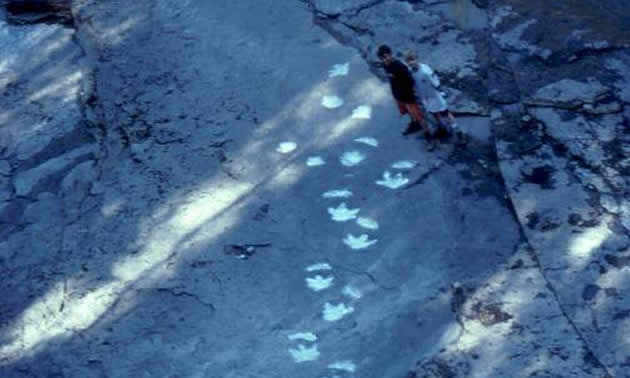Prehistoric footprints
The Dinosaur Discovery Gallery is an exciting place to learn more about prehistoric creatures

In the year 2000, two young boys—Mark Turner (11) and Daniel Helm (nine)—were happily tubing down Flatbed Creek near Tumbler Ridge. After falling off the tubes they quickly scrambled to shore where they saw some interesting impressions in a rock. While playing together their imaginations became quite colourful, and they started to pretend that the impressions were dinosaur tracks. They quickly came to the conclusion that the tracks might actually be real. Encouraged by one of their fathers, (after a period of time spent convincing him), they contacted some paleontologists who were temporarily working in the area. They were put in touch with the appropriate people, and in 2001, their discovery was confirmed to be authentic.
“At the time it was the longest known trackway of an armoured plant-eating ankylosaur, a Humvee-like dinosaur. Ankylosaur tracks are not well known worldwide but quite prevalent in Western Canada,” said Lisa Buckley, curator and collections manager of the Dinosaur Discovery Gallery. “The period of time we are dealing with is approximately 93 to 97 million years ago.”
It was a very exciting time for everyone.
Fossil displays
This discovery led to the creation of the Peace Region Palaeontology Research Centre, and in 2007 the Dinosaur Discovery Gallery came into being. The gallery contains paleontology exhibits that include a full-scale replica of a 100-million-year-old dinosaur track environment.
“Although there have been many fossils discovered in the region, only one to 10 per cent found are on display, with the rest being used for science and research,” said Buckley.
The central display features some of the better looking fossils of dinosaur tracks and their track makers. Other fossils exhibited are those of marine reptiles and fish from 225 to 250 million years ago, ones that are much older than the featured dinosaurs.
“They are the most bizarre looking creatures you could find,” said Buckley. She indicated that they would have resembled what we envision the Loch Ness monster or ogopogo to look like.
A lesser-known fact is that British Columbia’s only dinosaur remains are housed here. Historically few researchers have really looked for bones in B.C. because of the rugged terrain, but bones have been found when searches were conducted. Starting in 2008, an excavation of B.C.’s first complete dinosaur skeleton—that of a duck-billed dinosaur—has been embarked on, with the hope that it will be completed during the summer of 2012.
Activities for the kids
Learning how to clean fossils, make fossil replicas or excavate dinosaur bones, is an opportunity most children will talk about for months afterward. All types of interactive activities are offered, including tours to the track sites, bird-watching tours and games.
The Dinosaur Discovery Gallery is continuously expanding, with the exhibits being improved upon regularly. The fossil samples, photos and interactive theatre all provide many options for visitors to learn more about the history of the Peace River Region—it’s exciting for people of all ages. Maybe you will be the next person to discover a new trackway while exploring Tumbler Ridge.






